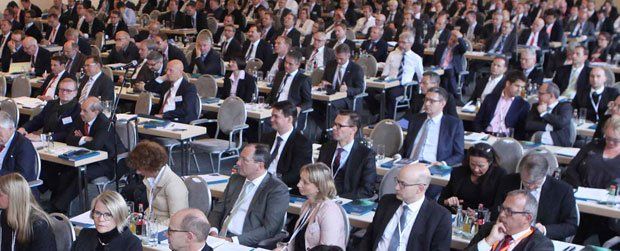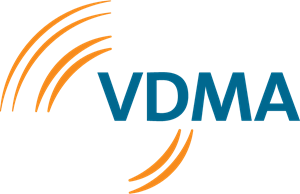Industry 4.0
Working group 3

Industry 4.0
430 managers from the mechanical engineering industry hold intensive discussions at the Industry 4.0 working group: New business models - Mission Possible!
There is general agreement: industrial production is undergoing a decisive structural change due to digitalization. New digital business models are made possible by Industry 4.0 and are already emerging.
The success stories of Siemens and SAP motivate the attending entrepreneurs to deal with the topic intensively. In addition, the national Industry 4.0 Platform is developing framework conditions to make Industry 4.0 a success in German industry. The available information from the platform impressively proves this.
With practical examples, Dr. Schwarz, Deutsche Post, Dr. Struth, Robert Bosch and Mr. Soder, SEW Eurodrive, deepen the approaches of their companies.
Until now, little was known about the fact that Deutsche Post has changed from a logistics service provider to a system planner for its own logistics centres. Digitally supported technologies enable the collection and sorting of 50,000 parcels per hour, 24 hours a day in the most modern logistics centre.
Dr. Struth, Robert Bosch. sees many benefits in Industry 4.0 along the value chain: higher productivity, real-time quality control, less energy consumption. Bosch offers coordinated components and concepts for Industry 4.0 from a single source. He sees the qualified training and further education of associates who must and want to keep pace with digital change as particularly important.
For Johann Soder, Managing Director Technology at SEW-EURODRIVE, one thing is certain: "Anyone who does not set the decisive course for his company for Industry 4.0 now, will face significant competitive disadvantages in the coming years. In particular, he believes that management has a duty to set an example of the new digital way of thinking.
Those who do not set the decisive course in their company for Industry 4.0 now, expect significant competitive disadvantages in the coming years.
Johann Soder, SEW-EURODRIVE
The TED surveys show that Industry 4.0 has arrived in mechanical engineering. Different speeds are not surprising and are due to the heterogeneity of the industry. Data analysis and data exchange are driving but also critically evaluated components, as the TED expansion shows. B2B platforms for the processing of business transactions will come, but the question of the need for regulation remains open.
Industry 4.0
At the general assembly on 11 November, the VDMA wants to provide important orientation with the working group "Industry 4.0: New Business Models - Mission Possible!
At the upcoming general meeting in Berlin, the working group "Industry 4.0: New Business Models - Mission Possible!" will focus on industry 4.0-based business models and provide insights into current practice. Leading industry representatives from the Industry 4.0 platform will provide information on the current state of development.
Visitors to the workshop will also be able to contribute their views on the topic via two TED surveys and take part in the discussion in the plenum. As moderator of the event, Hartmut Rauen, Deputy General Manager of the VDMA, will lead through the morning and provide information about various services of the association.
Decisive role for mechanical engineering
Due to digitalisation, industrial production is currently in the middle of a structural change. The German mechanical and plant engineering industry has a decisive role to play in this process. Within the Industry 4.0 platform, companies, trade unions, associations, science and politics are therefore working on the framework conditions to make Industry 4.0 a success in German industry.
Prof. Dr. Siegfried Russwurm, Member of the Managing Board of Siemens AG, and
Bernd Leukert, member of the SAP SE Executive Board, are members of the management of the German government's Industry 4.0 platform. They report on current developments in the joint initiative, but also from their companies. For both companies, intelligent software and modern control systems are currently changing the rules of the game.
A Look at Other Companies
Digitisation affects the whole economy. Some companies in the mechanical engineering sector are already well advanced as pioneers. Dr. Werner Struth, Managing Director Robert Bosch GmbH and Johann Soder, Managing Director SEWEurodrive GmbH & Co KG, will present the strategies of their companies in the last part of the workshop.
Industry 4.0
Working Group III of the VDMA General Assembly will focus on industry 4.0-based business models and provide insights into current practice on November 11, 2016 in Berlin.
Vertical digitization is mandatory - the horizontal freestyle: Industrial production is in the middle of a structural change due to digitization. The mechanical and plant engineering industry in Germany has a decisive role to play in this process. The Hannover Messe 2016 has shown that Industry 4.0 has arrived on a broad scale. The digitalization of production processes and products has made great progress in the last three years. This has laid the foundation for the next step: horizontal networking with value-added partners and customers via the Internet.
Pros and cons of digital services
The opportunities offered by digital business models are currently being intensively discussed. The word about disruption is making the rounds. Offers such as Uber, AirBnB or Spotify are examples of how new digital services are emerging within a short space of time and threatening traditional provider industries. On the one hand, this raises the question of what expectations the mechanical engineering industry has of new digital business models. On the other hand, it is likely that in future parts of the value chain will be handled via platforms and that mechanical engineering will be threatened by an "Amazon of production" that will shift between companies and customers.
Digital thinking is in demand
Disruption does not happen through the one-to-one digitalisation of an analogue technology, but through creativity and new thinking. Especially in management, a digital mindshift is needed, because new things begin in the mind. It can already be observed that the boundaries between producers, service providers, suppliers and customers are blurring. Today, nobody can predict the final state of this development, but nobody can close their eyes to the upcoming changes.
Working Group III offers orientation
At the general meeting on November 11, 2016, the VDMA would like to support companies with the working group "Industry 4.0: New Business Models - Mission Possible! Giving orientation. The event will provide an overview of the status of industry 4.0-based business models. Leading industry representatives of the Industry 4.0 platform will provide information on the current progress of the initiative of the German government, industry and associations.
Digital business models are already on the market in the consumer industry. A concrete example will be used to present the procedure and implementation steps for market success. In addition, entrepreneurs from the mechanical engineering sector will report on their new digital business models. Visitors to the working group will be able to contribute their views on the topic via two TED surveys and orient the discussion in the plenum to concrete questions.
"For digitization, companies have to rethink and be creative."
Dietmar Goericke, VDMA




